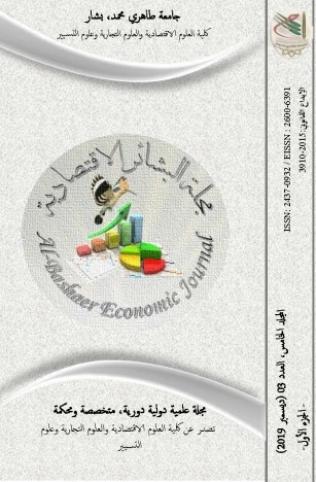
Al Bashaer Economic Journal is an international, Quarterly and open-access Journal, indexed in (ASJP, DOAJ, IndexCopernicus, EBSCO) and published by the faculty of Economic and Management Sciences of Tahri Mohamed University, Bechar (Algeria). It publishes for free, original theoretical and applied contributions from researcher and Phd students, on the topics of economics, commercial sciences and management sciences (Economics, Management, Finance, etc.), and relating to specific economic issues, the Algerian one in particular and the international economy as a whole, in three languages (Arabic, French or English). The contributions proposed for publication in the journal must be original, must respect the ethical charter of the journal, as well as the conditions of publications. At last, the submissions are subject to double-blind expertise by renowned experts and in accordance with international standards. Scope: Become a reference when it comes to publishing original scientific articles. Aims: Publishing research papers specialized in economics, business and management that would contribute to the advancement and development of humanity. Values: Scientific: Publish specialized scientific articles in line with international academic standards. Objective: Promote an objective and neutral scientific treatment of the topics addressed. Positive: Offer practical solutions to important economic issues. Reviewing Process: • Submissions are inspected by the Editorial Board in a first time, which must judge their compliance with the publication rules. If the article does not comply with all the rules, it’s automatically rejected. • Then, the paper is subjected to an anti-plagiarism check. If the plagiarism rate exceeds 10%, the article is rejected and the authors are blacklisted and banned from publishing from the journal for 5 years. • If the paper complies with publication standards, it is sent anonymously to two experts (double Blind peer-review), specialized in the topic of the submission. The experts must be from a different institution (and country if possible) from the author(s). • If both reports are positive and in favor of the submission for publication, the expert reports are sent to the authors (after hiding the identity of the experts), so that they make the requested changes (of form and/or contents). As well, if one of the two reports is negative, the proposed article is automatically rejected. • After the reception of the final submission, it is examined by the committee or the review to check whether the changes requested by the experts have actually taken place, and a copy is sent to the reviewers for confirmation. Otherwise, it is returned to the authors with the obligation to rectify it before 72h, under penalty of final rejection.. • Finally, the submission is sent to the secretariat of the journal for final editing and publication. Reviewing Process: • Submissions are inspected by the Editorial Board for the first time, which must judge their compliance with the publication rules. If the article does not comply with all the rules, it’s automatically rejected. • Then, the paper is subjected to an anti-plagiarism check. If the plagiarism rate exceeds 10%, the article is rejected and the authors are blacklisted and banned from publishing from the journal for 5 years. • If the paper complies with publication standards, it is sent anonymously to two experts (double Blind peer-review), specialized in the topic of the submission. The experts must be from a different institution (and country if possible) from the author(s). • If both reports are positive and in favor of the submission for publication, the expert reports are sent to the authors (after hiding the identity of the experts), so that they make the requested changes (of form and/or contents). As well, if one of the two reports is negative, the proposed article is automatically rejected. • After the reception of the final submission, it is examined by the committee or the review to check whether the changes requested by the experts have actually taken place, and a copy is sent to the reviewers for confirmation. Otherwise, it is returned to the authors with the obligation to rectify it before 72h, under penalty of final rejection.. • Finally, the paper is sent to the secretary of the journal for final editing and publication. Copyright Policy (Common Creative Licence): Attribution-NoDerivatives 4.0 International (CC BY-ND 4.0) This is a human-readable summary of (and not a substitute for) the license. Disclaimer. You are free to: • Share — copy and redistribute the material in any medium or format • for any purpose, even commercially. • The licensor cannot revoke these freedoms as long as you follow the license terms. Under the following terms: • Attribution — You must give appropriate credit, provide a link to the license, and indicate if changes were made. You may do so in any reasonable manner, but not in any way that suggests the licensor endorses you or your use. • NoDerivatives — If you remix, transform, or build upon the material, you may not distribute the modified material. • No additional restrictions — You may not apply legal terms or technological measures that legally restrict others from doing anything the license permits. Notices: • You do not have to comply with the license for elements of the material in the public domain or where your use is permitted by an applicable exception or limitation. • No warranties are given. The license may not give you all of the permissions necessary for your intended use. For example, other.
Al Bashaer Economic Journal is an international, Quarterly and open-access Journal, indexed in (ASJP, DOAJ, IndexCopernicus, EBSCO) and published by the faculty of Economic and Management Sciences of Tahri Mohamed University, Bechar (Algeria). It publishes for free, original theoretical and applied ...
تأثير أنظمة سعر الصرف على النمو الاقتصادي في مجلس التعاون ...